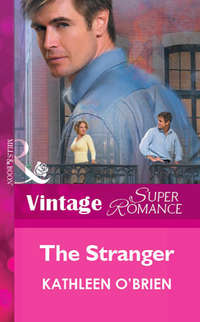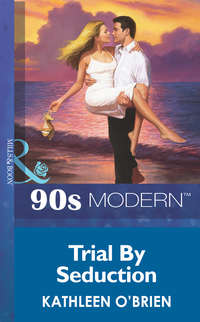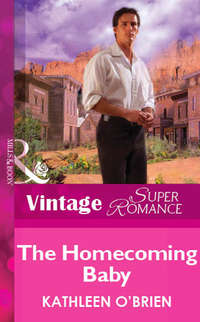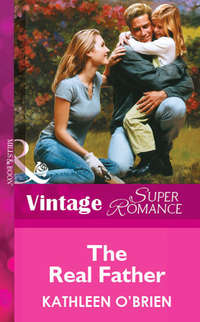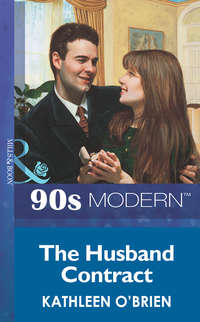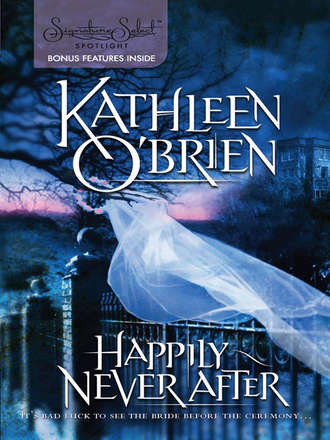
Полная версия
Happily Never After
It wasn’t fog or moss. It was exactly what she had thought it was.
It was a piece of lace from Sophie Mellon’s wedding dress.
MARY JO’S CAFÉ AND SWEET SHOP was charming from the street side, all hanging baskets of red geraniums, green awnings and shiny black wrought-iron tables and chairs.
But from the alley out back, it looked like any other strip retail business, just a no-frills utility door, an over-filled Dumpster, a teetering stack of wet wooden palettes and an empty plastic bag bumping up against the wall, shoved around by the wind.
Kelly pulled into the dead-end alley, did an automatic three-point turn to leave her minivan facing out and then cut the engine. Here under the trees, it was cool and damp and dirty. The twilight was a mournful blue.
She suddenly wished she’d put this chore first on her list today, not last.
But she had to stop this foolishness. She wasn’t by nature a coward, though she certainly had been acting like one ever since Lillith’s death.
Like last night. Asking Brian to stay had been ridiculous. He had sacked out in the guest room, exhausted from his own long day, the minute they got to Kelly’s place. She’d spent another several hours in the studio, working, essentially alone anyhow.
Still, it had been nice to know another human being was nearby.
He’d taken her to get her van as soon as the dealership had called, and then, as pleasantly as ever, they’d gone their separate ways. They’d both had a million things to do.
Now she was tired. But Kelly had promised Mary Jo she’d return all the café trays they’d used for the funeral food, so, in spite of the eerie blue shadows in the alley, she had to do it.
The café was still open—it would be serving dinner till ten—but most of the other stores on the street were already closed. The only two cars in the alley were Mary Jo’s Honda and Kelly’s minivan, which wasn’t glamorous but was convenient for transporting the big sheets of stained glass she needed for special projects.
Kelly had called ahead, so Mary Jo was waiting for her at the utility door. They unloaded the trays efficiently without much chatter and stacked them in the café’s kitchen.
“Thanks for bringing the stuff back,” Mary Jo said as she walked Kelly to the van. “I can use it tonight. You know what weekends are like.”
Kelly nodded. And they walked the rest of the way in silence. Apparently Mary Jo didn’t feel like making small talk any more than she did.
Maybe Mary Jo realized, just as Kelly had, that handling the funeral food had been the last little chore they’d ever do for Lillith.
After the accident, the first day or two had brought a mercifully numb shock. After that, the details of the funeral had been hectic and distracting.
But now it was over. Life went on. And they had to face that it went on without Lillith.
When they got to the van, Mary Jo hugged her. “Did you get that starter looked at?”
Kelly smiled. “Yeah. Transmission needed work, too. Two thousand dollars altogether. But at least it starts right up.”
“Ouch.” Mary Jo grimaced. “Well. Take care.”
“I will.” Kelly watched as Mary Jo turned and walked slowly back to the store. She didn’t look as if she had enough energy to get to the door, much less shepherd her café through the dinner rush. Tragedy had so many repercussions, big and small.
“Oh—wait—” Kelly said suddenly. “I meant to ask you. Have you heard anything about Sophie being back in town?”
Mary Jo turned. She shook her head. “No. Dale over at the Texaco came in for lunch today, and he said he’d seen Sebastian, which surprised me. It’s been a couple of years since the Mellon heir graced us with his presence, hasn’t it? But Sophie? No. As far as I know she’s still an inpatient.”
Kelly thought about mentioning what Lily had said, but decided against it. And there wasn’t any point asking Mary Jo about the scrap of lace. Mary Jo hadn’t been a member of the wedding party, so she would never have seen Sophie’s dress anyhow.
So Kelly just said goodbye again and watched Mary Jo go back inside. Then she opened the door of her van, eager to get out of this alley now that she was alone. Something was rummaging behind the Dumpster, but Kelly couldn’t see what. The limp blue twilight had lost its struggle with darkness. Only small patches of light lay between long, black stretches of shadow.
Definitely time to go. Besides, if she went straight home now, she could put in a good four hours on the wine-shop project, which was falling seriously behind.
But darn it. Down at the front end of the alley, a large refrigeration truck had pulled in, blocking the exit. Behind her, the alley came to a dead end, so she’d have to wait.
Maybe the driver would make his delivery quickly. In the meantime, she could at least check on the glass in the back. With her keys still in her hand, she circled the van and opened the hatch doors.
She’d had special slots installed in the cargo area so that she could transport sheets of glass safely. Today, all the slots were filled.
The wine-shop project was the most challenging commission she’d ever landed—a tunnellike entryway for the upscale establishment, with lush stained-glass grapevines winding on both sides, and even on the ceiling.
This afternoon she’d picked out half a dozen sheets of the most beautiful green full-antique glass. It had cost a fortune, virtually eliminating any hope that this project would turn a profit. But the glass had such extraordinary linear striations, which would produce grape leaves so textured and real no customer would walk through that entryway without reaching out to touch them.
She hadn’t been able to resist. Anyhow, if this project turned out to look as spectacular as she hoped, it would be worth its weight in permanent advertising.
She adjusted a couple of boxes so that everything was wedged in snugly, and then, hearing an odd noise behind her, she turned.
Trig Boccardi was standing only about four feet behind the truck, a glower on his heavy face, erasing what little good looks he had left from his high-school glory.
Unnerved, Kelly glanced around. Mary Jo’s café was the last store at the dead end. Unless he had climbed over the alley fence, or come out of the café kitchen, he had pretty much materialized out of thin air.
“Hi, Trig,” she said neutrally. She whisked shut the van’s cargo doors. She didn’t like to have those pricy sheets of glass exposed to anyone as unpredictable as Trig. “Where’d you come from? You startled me.”
“You took it.” Trig’s brows hung low over his eyes. “Didn’t you?”
She didn’t like his tone, which was strangely aggressive. And, as usual, he wasn’t making sense. “I don’t know what you mean. Took what?”
“The lace. You took the lace from the wreath. Don’t pretend you didn’t. I saw you do it.”
Kelly’s stomach tightened. He had seen her? He had been watching her? From where? No wonder she’d had such a creepy feeling about spending the night alone.
How often did he do that?
“Yes,” she said. “I took it.”
“You shouldn’t have. It’s not yours.”
She glanced toward the front of the alley. The refrigeration truck was still there. But that wasn’t all bad. It meant that somewhere nearby was a truck driver, too. Just in case.
And Mary Jo was just inside the café. She’d come out if she had any idea something was wrong. Kelly began to move around the van a little, toward the driver’s side. Toward the horn.
“You shouldn’t have taken it,” he repeated. He had followed her all the way around, still staring intently.
“Why not?” She paused by the door, wishing she’d left the window open so she could just reach in and touch the horn. She tried to read his expression, unsure whether he was very sad, or very angry—or maybe even a little frightened himself. “Did you put the lace there, Trig?”
He recoiled. “Of course not. She put it there.”
“She? Who?”
He blinked several times, always a sign that he was agitated. “You know who. It’s hers.” He advanced a step. “She’ll be mad that you took it.”
Behind her back, she began to rearrange her keys in the palm of her hand, so that the metal points stuck out between her fingers. Trig was big and muscular, but his thinking was slow, and she hoped his reflexes were, too.
“Maybe you’re right,” she said. “Maybe I shouldn’t have. I was just surprised when I saw it, and I wasn’t thinking. Maybe I should put it back.”
He thrust out his hand. “I’ll put it back. You shouldn’t have taken it.”
Did he think she carried it with her everywhere she went? “I don’t have it with me,” she said. “Don’t worry about it, Trig. I’ll take care of it later.”
“No,” he said. He took another step, his head ducked low, like an animal who was considering an attack. She’d never appreciated how much like a bull he actually looked, with that bulky body and that triangular head.
The groan and grind of gears just ahead told her the truck was leaving. Taking advantage of the distraction, she pulled open the door and climbed quickly into the driver’s seat. Shutting herself in, she rolled down the window and looked sternly at Trig.
“I want you to go home now, Trig. And I want you to leave me alone.”
He put his hand on the door. “No,” he said harshly.
“Yes,” she said, putting her keys in the ignition and turning over the engine, which, thankfully, started right up. Suddenly the two thousand dollars she’d paid the dealership seemed like a bargain.
“You have to go home now. And listen to me, Trig. I don’t know why you were watching me the other night, but I want you to stop it. You can get in a lot of trouble for things like that.”
He frowned, backing away a couple of inches, as if her stern tone startled him. He shook his head, a jerky and uncoordinated denial.
“I wasn’t watching you,” he said thinly. He blinked several times. “I was watching her.”
CHAPTER SIX
THE NEXT MORNING Kelly sat at her studio’s semicircular work desk, heart-shaped pieces of glimmering green glass littering the countertops. It looked as if, sometime during the night, the ceiling had rained enchanted leaves.
But she wasn’t paying any attention to the freshly cut pieces, which were ready to be burnished with foil. Instead, she was listening to the ringing telephone crooked between her ear and her shoulder, and staring at a photograph she held awkwardly in her newly bandaged fingers.
She hardly noticed the bandages. She always sliced or burned herself while she was cutting and grinding small pieces. If nothing required stitches, she considered it a good day’s work.
Besides, the picture held all her attention. She hadn’t looked at it in years. It had been tucked carefully away in the pages of an old scrapbook. It was a picture of Sophie’s wedding party, taken the night of the rehearsal dinner.
No wonder she’d been reluctant to keep it where she could see it. It was as potent as an uncorked vial of magic smoke. Kelly found that she could remember every moment of that night, as if it had been yesterday.
Such vivid memories… The scratchy seams of her green dress, which had been a little too tight. The way they’d all laughed because the cello player was out of tune. The time Lillith had sprayed champagne through her nose when Kent Snyder told a vulgar joke.
She remembered it all, every emotion, right down to the deep, scraping ache in the hollow of her heart.
While the others had been laughing and drinking and playing silly games, Kelly had been counting the hours until Tom officially belonged to Sophie. Twenty-four, twenty-three, twenty-two…
By the time the wedding party corralled a waiter and asked him to take this picture with Kelly’s disposable camera, it was one in the morning. Only seventeen hours until the wedding.
Looking down at those faces now, with all the bitter knowledge of hindsight, Kelly thought maybe she could detect the turmoil seething under the surface smiles.
Against her ear, the phone was still ringing. She hung up and dialed a second time, in case she’d made a mistake. As it began to ring again, she tilted the picture, to better catch the light.
Nine young people. It should have been ten, but Samantha, the maid of honor, had been only seventeen, too young to drink and dance and giggle the night away with the others. She’d been sent home with her parents hours before the picture was taken.
Which left just nine. Sophie and Tom, the bride and the groom. Sebastian, who was the best man. Three ushers— Kent Snyder, Bill Gaskins and Alex VanCamp. Three bridesmaids—Dolly, whose last name was now Tammaro, Lillith, and Kelly herself.
All young. All smiling. But how many of them, Kelly wondered, had been hiding something that night?
Kelly’s own sick guilt was fairly obvious, she thought. Her eyes looked shadowed, and she had her hands clasped in front of her, white-knuckled, almost as if the camera were a harsh deity from which she begged forgiveness.
Sebastian’s head was turned away from the camera, but his jaw was set at a stiff angle, and his shoulders were oddly braced. It was impossible to tell whether he was staring at Sophie or Tom.
Sophie looked gorgeous, of course, in her ice-blue party dress. But her smile was too bright, too fake, as if she were dramatically intoxicated, though Kelly remembered that Sophie had hardly touched her wine that night.
Dark-haired Lillith was making a kissy face, just as energetic and full of spunk then as she had been until the night she died.
Kelly shut her eyes briefly, unable to look at Lillith very long.
They were standing just as they had planned to stand the next day, lined up by height. Dolly, the shortest of the bridesmaids, was on the very end, holding up her dress, because she’d just caught her hem in her high heel and torn it. She was glaring over at Kent Snyder, who, Kelly remembered, had just made a rude joke about Dolly, the clumsy cow.
Kent had been very drunk. The photographer had caught him sticking his tongue out and holding up two fingers to make devil horns behind Bill Gaskins’s head.
Alex VanCamp looked bored. None of them had known Alex very well. He’d been a special friend of Sebastian’s from college, and he’d seemed as if he could have been interestingly dangerous, if he’d found them worth the trouble of leading astray. Dolly had flirted with him, to no avail.
Kelly remembered thinking how peculiar it was that no one in the wedding party seemed to be connected to Tom, not even his groomsmen. Should that have tipped them off? He had seemed like a stranger at his own wedding.
Which brought her, finally, to Tom’s handsome face.
This was the one face that should tell the whole story, and yet, even now, it didn’t. Gorgeous in his tux, he was smiling that familiar lopsided smile, and one of his eyebrows was arched, as if he found the whole thing entertaining, but unimportant.
He seemed unaware of Kelly, of course, though just thirty minutes before she’d been with him in a corner, crying, touching his face one last time. But then, in a weird way he seemed unaware of all of them, as if he were alone in the picture.
Sophie clung to his arm, her whole body yearning toward him. But his body wasn’t responding. Not a single muscle bent in her direction even a fraction of an inch.
Still, though any stranger could look at this picture and see that the bride was more in love than the groom, Kelly didn’t think anyone would guess that, less than seventeen hours later, the groom would disappear.
“Hello?”
Kelly dropped the photo, shocked to realize that someone had answered the telephone. It was a woman.
“Hi. My name is Kelly Ralston. I’m trying to locate Kent Snyder. Do you know if I have the right number?”
A pause stretched oddly. “Yes,” the woman said finally. “This is the right number.”
Kelly couldn’t believe her luck. She’d been trying all morning to reach any of the other members of the wedding party. She wasn’t sure why—just a vague sense that one of them might know something about the wedding lace she’d found on the roadside marker, whether it really was a match for Sophie’s gown.
But they’d all moved away. Only she and Lily had stayed in touch. Tracking even one of the others down had proved more difficult than Kelly had imagined.
Kelly wouldn’t have chosen to start her inquiries with the hard-drinking, slightly vulgar Kent Snyder. But she’d take what she could get. Though she’d left messages several places, this was her first breakthrough.
“Oh, good. I’m sorry to bother you, but Kent and I—” What could she say? They hadn’t been friends, exactly. She’d spent a lot of time with him for the week of wedding festivities, and then she’d never seen him again.
“Some years ago we were in a wedding together. I needed to get some information, and I thought perhaps he could help me. Is he there?”
“No,” the woman said. “Look, what did you say your name was?”
“Kelly Ralston.” Kelly thought the woman sounded edgy. Darn it. Kelly hoped she hadn’t stumbled into some kind of divorce tangle. “I was Kelly Carpenter at the time. We were both in Sophie Mellon’s wedding, ten years ago, in Cathedral Cove.”
“Well, I’m sorry to have to be the one to tell you, Kelly, but Kent is dead.”
Kelly was so surprised she couldn’t speak for a moment. Her glance fell on Kent’s picture. He had been a good-looking young man, in a thick-neck, not-very-bright sort of way. He’d been putting on weight even in his early twenties. His shirt was too tight, the buttons threatening to burst. And his face was already too red, flushed by alcohol.
“Kelly?” The woman on the telephone softened her voice, though she still sounded edgy. “I’m sorry. I know it’s a shock. It was to us, too. It was an accident. Two weeks ago.”
Kelly’s voice felt rusty, as if she’d been mute for hours, not seconds. “He had an accident? A car accident?”
“No, although God knows it’s a miracle he never did, the damn fool.” The woman cleared her throat. “It was a hunting accident. He must have stumbled. His gun went off.”
“I’m so sorry.” Kelly shut her eyes. “But are you sure? I mean, are you sure it was an accident?”
“I guess you didn’t know him all that well. I lived with him for eight years. I knew him inside and out. He was a good man, but he drank too much, no reason to sugarcoat it. He had no business handling a gun, the condition he was in, but there was no stopping him when he had his mind made up.”
Somehow Kelly got through the rest of the call, offering condolences and apologies for calling at such a terrible time. When she put the telephone down, her hands felt cold.
Strangely numb, she picked up one of her rich green-glass leaves and held it to the light. The striations really were lovely. She hoped she’d got all the veins “growing” in the right direction.
She remembered what her first stained-glass teacher had told her, all those years ago in the basement of the Mellon house. A gorgeous young French artist, Jean Laurent, had been hired to create a two-story St. George and the Dragon window to hang at the top of the Coeur Volé staircase.
Kelly and Sophie had both instantly fallen in love. But while Sophie lusted after the Frenchman’s black hair and bulging shoulders, Kelly had fallen in love with the glass. The shining green of the dragon’s scales, and the rich, glowing red of his bleeding heart, the twining vines and billowing clouds behind St. George’s triumphant sword.
Probably Jean had become Sophie’s lover. Kelly remembered odd absences, lingering glances. But he had also recognized Kelly’s passion and he had given her hours of his time.
When you cut your leaves, he showed her, or created your clouds, you couldn’t just pick the prettiest spot on your sheet of glass. You had to pick the one that followed the correct lines and rhythms of life.
Hair curled, leaves grew, shadows fell, and even dragons died, according to natural laws. Violate them in the glass, and the entire piece would always be vaguely unsatisfactory.
She picked up a second leaf, twirling it slowly in her bandaged fingers.
Natural laws.
She picked up the picture in her other hand. Two of those smiling people were dead now. Did that follow the laws of nature? Two of ten was twenty percent. If you took any random group of ten relatively intelligent, well-to-do twenty-somethings… Would twenty percent of them be dead within ten years?
The phone rang again.
She dropped the picture but held on to the two leaves. She clicked the talk button.
“Hello.”
“Is this Kelly Ralston?”
“Yes. Who is this?”
“This is Phil Tammaro.”
At first Kelly didn’t recognize the name. Tammaro? Did she know anyone named Tammaro?
“I’m Dolly’s husband.”
Oh, of course. She’d left a message there, after she’d finally tracked Dolly down through three completely different marriages, names and addresses.
“Yes,” she said, eager to make up for not remembering. “Yes, Phil, thank you for calling me back.”
“I just came in. I heard your message. I thought I’d better tell you—”
His voice broke, and at the sound Kelly’s heart stopped.
“—tell you about Dolly. You see, Dolly was in an accident. She—she’s dead.”
TOM HAD BEEN LOOKING for Jacob more than an hour before it occurred to him to check the cemetery.
It was a beautiful Saturday morning, still warm but with a crisp hint of fall. After the funeral, Jacob had asked Tom to stay in Cathedral Cove a few days. Jacob didn’t need to be alone right now, and since Tom wasn’t eager to get back to the whole stupid Coach O’Toole mess—not to mention the phone messages that would be waiting from an injured Darlene—he’d said yes.
He’d let his office know he was taking a week of vacation time, which hadn’t gone down well with Bailey, but so what? Every vacation Tom had taken for the past five years had been a working trip, schmoozing some potential client or attending some business conference. They owed him.
Besides, there wasn’t really any such thing as “getting away” if you had a cell phone and a laptop.
Yesterday, Jacob had slept late, so Tom had spent all morning answering e-mails, issuing instructions to his paralegal and hand-holding a couple of clients who wanted to know why you had to notify everyone on the planet before you set a court date for a hearing.
He assumed today would be the same. This morning, though, by the time he got off the phone, Jacob was gone. And he’d left his cell phone behind, which seemed to hint that he’d like to be alone.
It had been a sticky moment. Tom didn’t want to crowd Jacob, who was free to go wherever he wanted. Tom wasn’t exactly the prison warden. But still…though Jacob seemed to be pulling himself together a little, it had been only a week since his wife had died. He was still fragile enough that Tom would rather keep an eye on him.
Finally, just when Tom was starting to admit he was worried, he spotted Jacob’s car. It was pulled off the road, near the entrance to Edgewater Memorial Gardens.
Great. Just perfect. Tom felt for Jacob, really he did. Losing Lillith had put the man through sheer hell. But to tell the truth, Tom had endured all the hair-tearing and teeth-gnashing he could take for a while.
This definitely wasn’t how he handled his own challenges. His personal recipe for emotional recovery was a fourteen-hour workday followed by a run of maybe ten miles, or fifteen, or whatever it took to wear out every muscle and brain cell he had.
Cemeteries were for wallowing, and he didn’t wallow. His own parents, who had died when he was in college, had been cremated and scattered at sea. Clean and sensible. No desolate angels clinging to crosses, no granite effigies, no gut-wrenching epitaphs. No tilted, weed-covered tombstones and withered flowers to remind you that, in the end, even love gets tired of grief and forgets to mourn.




